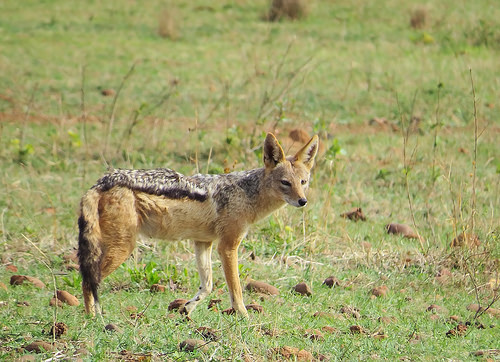Go Egyptian with jackals.
- Jackals are mammals that are native to southwestern Asia, southeastern Europe and Africa.
- The jackal term covers three species: the ‘black-backed’ – Canis mesomelas; the ‘golden’ – Canis aureus; and the ‘side-striped’ – Canis adustus, all belonging to the Canis genus, and they are from the family Canidae, the family of dogs.
- Jackals grow to be 38 to 51 centimetres (15 to 20 inches) in height, up to 81 cm (32 inches) in length, and generally weigh between 6 to 14 kilograms (13 to 31 pounds).
- The fur of a jackal’s body is generally coloured a combination of brown, tan, grey and white, while the golden species is usually mostly a golden brown colour; and the black-backed and the side-striped have black or dark coloured markings on either their back or sides respectively.
- Jackals may gather in groups of up to 30, hunting as packs, although they often live by themselves or as a pair, in a lifelong partnership with the opposite sex.
Black-backed Jackal
Image courtesy of Åsa Berndtsson/Flickr
- The habitat of jackals is primarily wooded areas or grassy plains, depending on the species, and they preyed upon by eagles, leopards and hyenas.
- The diet of jackals is primarily carnivorous, often consisting of reptiles, antelopes, birds and insects, as well as the occasional plant.
- Jackals mark their territory with their own body waste, to indicate to fellow animals that they are not permitted to enter their zone, and violations typically result in attacks.
- Female jackals have litters of between two to six pups, that are born and raised in dens, with the young being relocated every fortnight or so, and they generally have a lifespan of between 8 to 15 years.
- Jackals have good stamina and can run at speeds of 16 km/hour (10 miles/hour) for extended times, and they have the ability to run at speeds of up to 32 km/hour (20 miles/hour).
Bibliography:
Jackal, 2013, A-Z Animals, http://a-z-animals.com/animals/jackal/
Jackal, 2015, Wikipedia, http://en.wikipedia.org/wiki/Jackal
Jackal, n.d, Out of Africa, http://www.outtoafrica.nl/animals/engjackal.html







